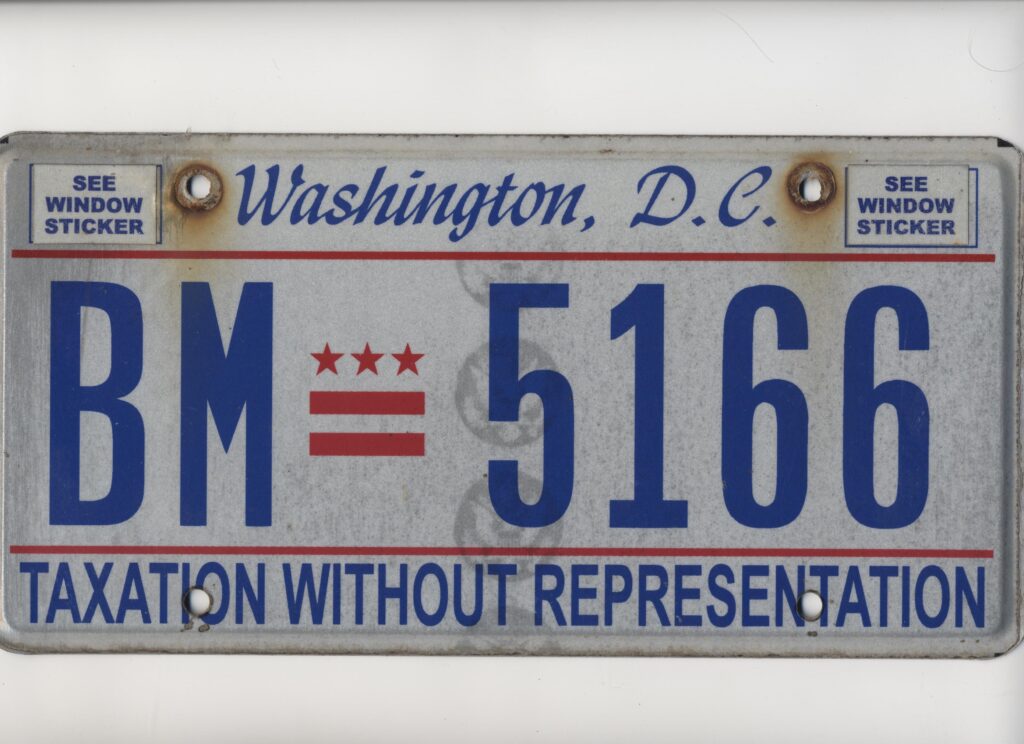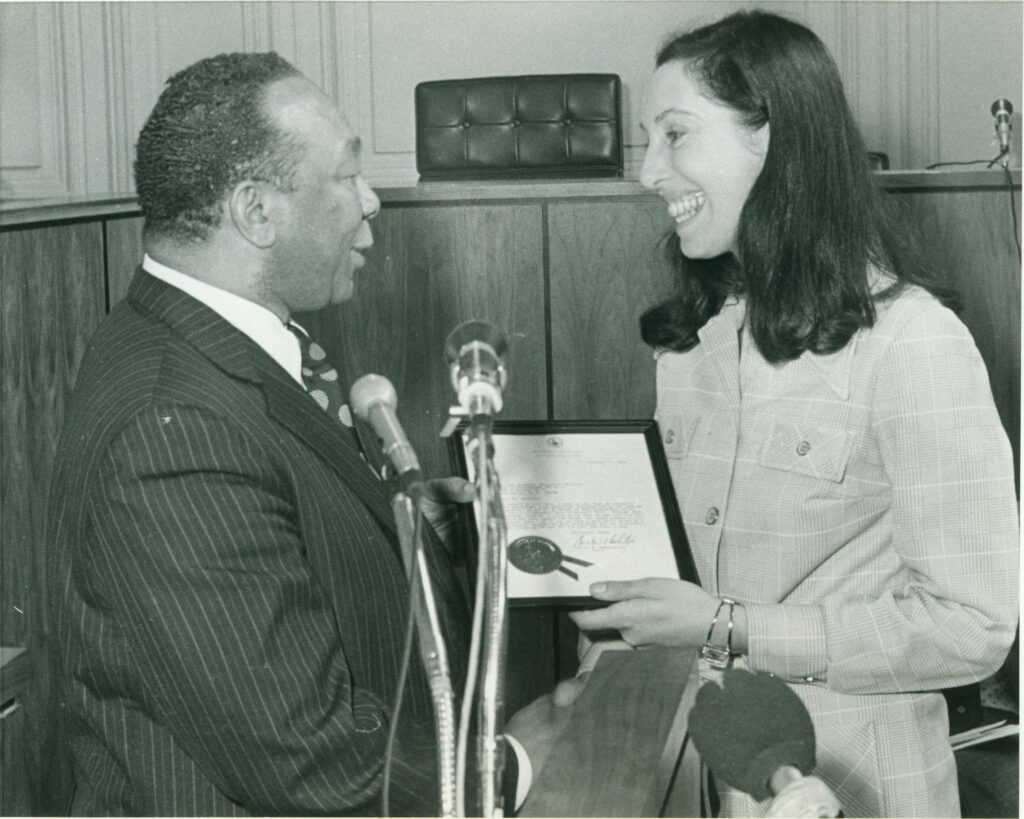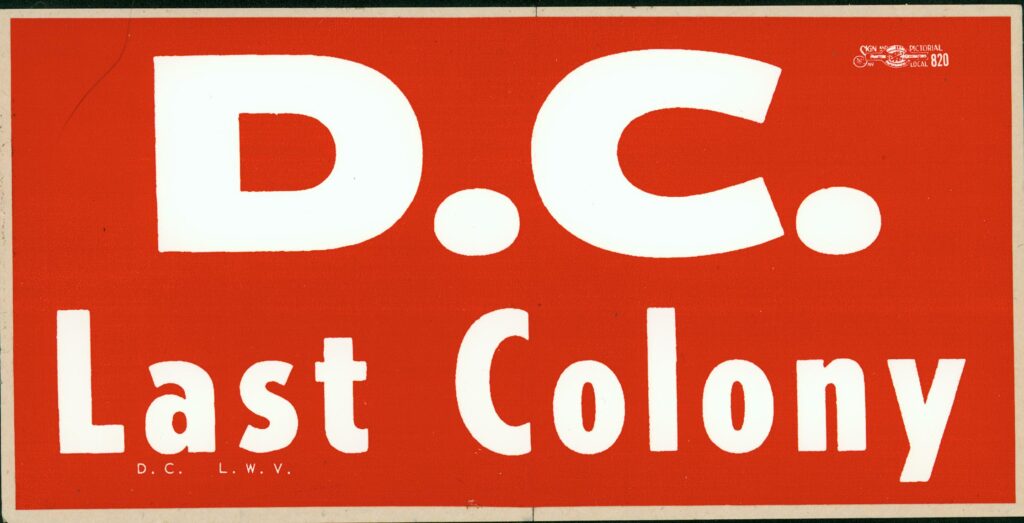The Whole Spiel
Happy 50th, Home Rule!
by Sarah Leavitt, Curator
April 2, 2024
Let’s get this out of the way first: I live in Maryland. I also vote in Maryland, and I am thus represented by voting members in Congress. So, while I certainly have an opinion about DC statehood and Home Rule (hint: I’m writing this in celebration of the golden jubilee of Home Rule), I am not a DC voter, and nor is my local government subject to the whims of the US Congress in quite the same way as capital residents.
This year, 2024, marks the 50th anniversary of the exercise of Home Rule in the District of Columbia. (The Home Rule vote was in December 1973; the first election was in 1974.) What does this mean? Home Rule is democracy. Home Rule is voting rights. Home Rule is what every citizen in America in every city enjoys (and non-citizens in certain cities, including DC and in Maryland): the ability to vote for their own local leadership.
When the District of Columbia was carved out of Maryland and Virginia in 1790, the idea was that former residents of Maryland would continue to vote in the Old Line State; former Virginians in the Old Dominion. This was amended in 1820 when Congress allowed DC’s white male landowners to vote for a DC mayor. This incarnation of Home Rule was not to last, however: Congress took away DC’s local elections in 1874, a few years after the 15th amendment granted suffrage to Black men. As many historians and activists have noted, fears of a Black voting majority led to the decision to wrest away municipal control in the 1870s and also to the decades-long delay in getting it back. For a century, DC’s municipal affairs were in the hands of Congress. Multiple US presidents from both parties, and many in Congress, supported Home Rule to no avail, until, finally, in 1974, DC residents voted for their own mayor and city council.
This triumph, though, is consistently at risk. DC’s elected government continues to serve at the pleasure of Congress, and Congress can veto municipal legislation. Just last year, three House Republicans brought up a bill for Congress to re-take control of the District. Their argument is based on the idea that DC’s current leadership is unfit to manage the city. Certainly, DC is not alone, and maybe not even a standout, in complex city politics. But at least for now, the partial enfranchisement ensures that DC voters have a say in their own municipal governance.
Here at the Museum we address the issues of Home Rule and its sister issue, DC statehood, both in our historical gallery on the first floor of the historic synagogue and upstairs in the Tikkun Olam (Repair the World) section of the core exhibition, Connect. Reflect. Act (pictured). Beginning with presidential advisor Simon Wolf in the 1870s, many Jewish Washingtonians have been involved in preserving the right of suffrage for DC residents. That work continues in the fight to make DC the 51st state, which would, among other things, grant District residents (finally) representation in the US Congress. In the exhibition What is Jewish Washington?, we feature a DC license plate that reads “Taxation without Representation” (pictured below) and a photograph of Mark Plotkin (1947-2019), a local Jewish radio personality who led the effort to put that phrase on the capital city’s cars.

Voting Rights section of Tikkun Olam portion of Connect. Reflect. Act., Summer 2023. Courtesy of the Lillian and Albert Small Capital Jewish Museum.

Voting Rights section of Tikkun Olam portion of Connect. Reflect. Act., Summer 2023. Courtesy of the Lillian and Albert Small Capital Jewish Museum.

Washington, DC License Plate that reads "Taxation Without Representation," 2000. Lillian and Albert Small Capital Jewish Museum Collection.
The movement for Home Rule heated up in the 1960s. In 1966, the Student Nonviolent Coordinating Committee (SNCC) and the Free DC Movement led a boycott of local merchants to pressure the Metropolitan Board of Trade to support Home Rule. Free DC was a group formed that year by DC newcomer and later “Mayor for Life” Marion Barry to advocate for the rights of DC citizens to elect their own government. The boycott campaign focused on the H Street NE and the 14th Street NW corridors which catered to African American consumers. Within a few weeks, more than 700 businesses displayed “Free DC” stickers in their windows to indicate their support of Home Rule in opposition to the Board of Trade.
The Jewish Community Council (now known as JCRC, the Jewish Community Relations Council) minutes, held by the Museum in our archives, show that Jewish leaders criticized the boycott at their meeting in March of that year. The Council was particularly interested in this boycott threat because so many of the targeted merchants were Jewish. As the Jewish Telegraph Agency reported that week (March 22, 1966), the Council “criticized Negro groups which are leading a boycott of local merchants, many of them Jews.”
Though the Council reiterated its support for Home Rule, calling it “morally desirable and imperative,” the group disavowed the boycott because it “coerces businessmen who may have no views on Home Rule.” The Council saw the boycott as “a violation of the freedom of merchants to have an opinion or to have no opinion.”
Jewish activist Jan Eichhorn (1938-2009), pictured below, certainly had an opinion about Home Rule. The Museum holds a collection of Eichhorn’s papers, some of which are on view in the Voting Rights section of the exhibition. The young Democrat moved to DC in 1964 to work for Congress, and soon got involved with the Home Rule movement. She was involved with campaigns in the early 1970s and, when Home Rule was granted, she ran and was elected as a local leader in the newly formed Advisory Neighborhood Commission (ANC) for her Southwest neighborhood. Staying connected to local politics, in 1990 she participated in a tax resistance campaign in which protestors pledged to hold their taxes in a special escrow account until statehood. Activists are still waiting for DC to become the 51st state.

DC Mayor Walter Washington presenting Janice Eichhorn with a framed letter that he wrote to her thanking her for her work on behalf of Home Rule. Letter dated October 11, 1973. Lillian and Albert Small Capital Jewish Museum Collection. Gift of Diane Liebert.

Red bumper sticker that reads "D.C. Last Colony," ca. 1960s. Lillian and Albert Small Capital Jewish Museum Collection. Gift of Diane Liebert.
Exploring Home Rule at the Capital Jewish Museum means thinking about voting as a Jewish value, as a right and a responsibility to treasure. I believe that the Jewish values of repairing the world, of responsibility for one another, caring for the earth, and so many more, mandate us to vote whenever and wherever we can.
So, happy Golden Jubilee to DC voters, and here’s a reminder that we are in an election year. Please register to vote, no matter where you live (you can do so during a Museum visit in the Community Action Lab, where you can also learn about voting rights reforms throughout the country and help advocate for DC statehood. Join the Museum throughout 2024 as we celebrate and protect the rights of everyone to hold opinions, including the right to hold no opinion at all.